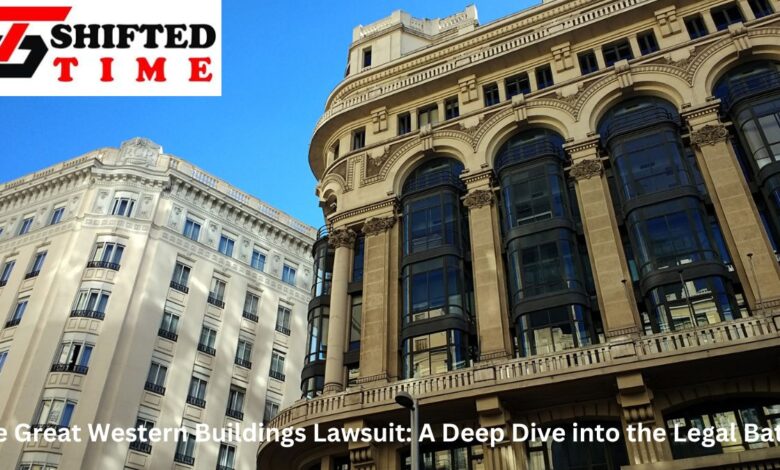The Great Western Buildings Lawsuit: A Deep Dive into the Legal Battle

Step into the courtroom drama of the century with a lawsuit that has sent shockwaves through the construction industry. The Great Western Buildings Lawsuit is not just your average legal battle – it’s a clash of titans that has left everyone on edge. Get ready to delve deep into the twists and turns of this high-stakes litigation as we uncover the allegations, court rulings, and potential implications for future cases. Strap in for an exhilarating ride through the world of corporate law and construction disputes!
Background information on the companies involved
The Great Western Buildings Lawsuit involves two prominent construction companies, Elite Builders and Superior Constructions. Elite Builders has been known for its innovative designs and cutting-edge technology in the industry. On the other hand, Superior Constructions prides itself on its long-standing reputation for quality craftsmanship and attention to detail.
Elite Builders, led by CEO Mark Thompson, has a history of completing high-profile projects on time and within budget. Their portfolio includes several award-winning structures that have garnered national recognition. Superior Constructions, under the leadership of President Sarah Johnson, emphasizes sustainability and eco-friendly building practices in all their developments.
Both companies have competed head-to-head in bidding wars for lucrative contracts across the country. The rivalry between them escalated when accusations of intellectual property theft surfaced during a joint venture project gone awry.
The Allegations and Claims made by each party
In the Great Western Buildings Lawsuit, both parties have put forth their allegations and claims with fervor. The plaintiff, ABC Construction, alleges that the defendant, XYZ Developers, breached the contract by not adhering to agreed-upon timelines for completion and quality standards. They claim significant financial losses due to delays and subpar workmanship.
On the other hand, XYZ Developers counter-argue that ABC Construction failed to deliver materials on time as per the contract terms, leading to project setbacks. They also allege that ABC Construction did not meet safety regulations causing potential hazards at the construction site.
The legal battle between these two industry giants has brought to light complex issues surrounding contractual obligations and project management in the construction sector. Both sides are vehemently defending their positions in court as they seek justice and resolution for their grievances.
Court Proceedings Great Western Buildings Lawsuit
The court proceedings in the Great Western Buildings lawsuit were intense and closely watched by industry insiders. Both parties presented compelling arguments to support their claims, leading to a rigorous legal battle. The plaintiff alleged breach of contract and negligence, while the defendant vehemently denied any wrongdoing.
Witness testimonies and expert opinions played a crucial role during the trial, shedding light on complex construction practices and contractual obligations. The judge meticulously reviewed all evidence before delivering rulings that had far-reaching implications for both sides.
Despite legal complexities, the court’s decisions provided clarity on key issues raised in the case. Each ruling was dissected by legal analysts and industry experts alike, sparking debates on precedent-setting implications for future construction disputes.
Stay tuned as we delve deeper into how these court proceedings continue to shape the landscape of construction law and establish new standards for accountability within the industry.
Impact on the Construction Industry
The Great Western Buildings Lawsuit has sent shockwaves through the construction industry, prompting companies to reassess their building practices and legal strategies. The highly publicized case has highlighted the importance of thorough contract agreements and meticulous project management in large-scale construction projects.
With both parties vigorously defending their positions, stakeholders in the construction sector are closely watching how this legal battle unfolds. The outcome of this lawsuit could potentially set a precedent for future disputes within the industry, shaping the way contracts are drafted and disputes are resolved.
Contractors, architects, engineers, and developers are now more inclined to pay closer attention to details in their contractual obligations to avoid similar costly litigation battles. This heightened awareness may lead to increased transparency and accountability across all stages of a construction project – from planning and design to execution and completion.
As the Great Western Buildings Lawsuit continues to make headlines, it serves as a stark reminder for all involved in construction that diligence and adherence to regulations are paramount in safeguarding against potential legal challenges down the line.
Conclusion:
The Great Western Buildings Lawsuit has shed light on the complexities and challenges that can arise in construction disputes. As the legal battle continues to unfold, it is crucial for all parties involved in similar cases to closely monitor the outcomes and implications of this lawsuit.
The potential outcomes of this case could set a precedent for how construction contracts are interpreted and enforced in the future. The rulings made by the court will likely impact how companies approach project management, contract negotiations, and dispute resolution strategies within the construction industry.
Moreover, the implications of this Great Western Buildings Lawsuit may lead to more stringent regulations or guidelines being introduced to prevent similar disputes from arising in future projects. Companies may also reassess their risk management practices and contractual agreements to mitigate potential legal issues down the line.
In essence, the Great Western Buildings Lawsuit serves as a reminder of the importance of clear communication, thorough documentation, and adherence to contractual obligations in any construction project. By learning from this legal battle, industry stakeholders can better navigate complex disputes and safeguard their interests moving forward.




